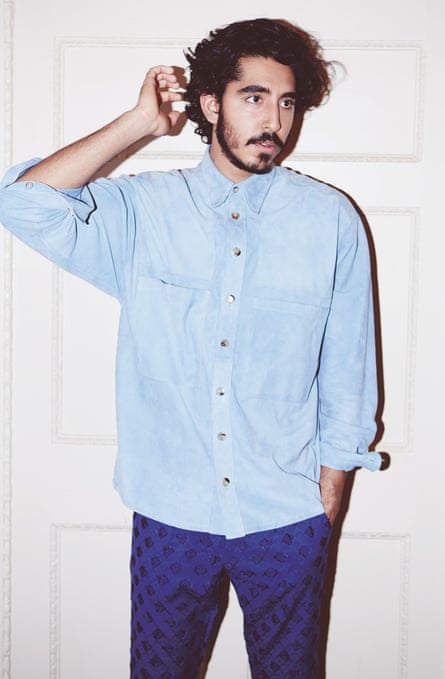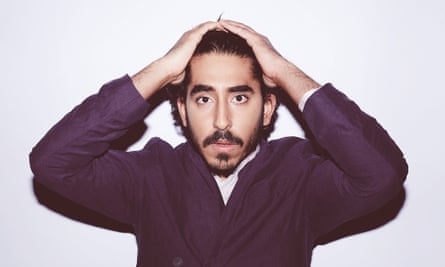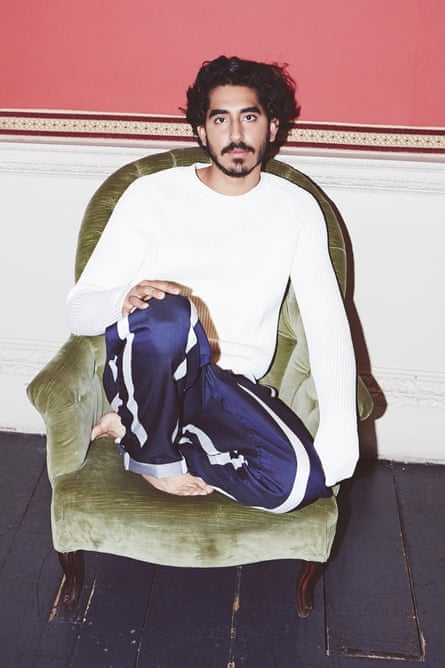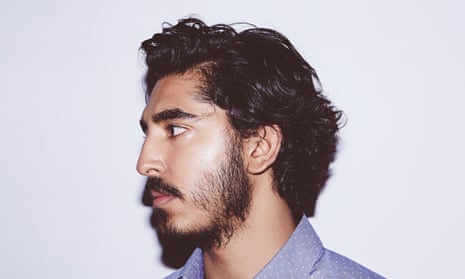Dev Patel is tugging away at his hair – his new, unruly, GQ-ish hair – and asking the Guardian photographer which beard oil to buy. The once dorky kid from Slumdog Millionaire, with the wobbly Indian accent and the Oscar team win, is posing gamely in pyjamas in a cramped room in Soho, London, looking very little like the Dev Patel you remember. He’s taller, for one thing. Broader. Beardier. He’s definitely got a swagger on. Is this his man-over?
The Guardian’s product and service reviews are independent and are in no way influenced by any advertiser or commercial initiative. We will earn a commission from the retailer if you buy something through an affiliate link. Learn more.
“It’s for a film,” he explains when we sit down, his arms and legs origamied on a hotel sofa. “My parents hate it, they think I look too messy. I think I’ll get stopped four more times than usual at airports now.” He giggles. “I’m not sure I should keep it.”
But it looks good. Quite Zayn Malik, I say. “Zayn who?” Is he joking? Him from One Direction. “Ooooh… yeah, but he can afford to do that. He won the genetic lottery, let’s say that.”
Patel is self-deprecating in the classic way: as a defence mechanism, landing jokes at his own expense before anyone else gets the chance to. He’s fidgety, too. And he keeps asking questions: how many brothers and sisters do I have, what’s my ethnic heritage, where do I live, how old am I, what’s this job like? Either to stall, or charm, or both, before I interrupt more firmly. Back to you.
“It’s cool,” he says, pouring glasses of water for us. “Let’s do it. Make it as awkward as you can. I’ll cry and get really emotional.”
Patel is starring in two major box-office draws over the next few weeks. The first is The Second Best Exotic Marigold Hotel, the follow-up to the unwieldy 2011 British sleeper hit, about an Indian retirement home pulling pensionable Brits to Jaipur. Dames Maggie and Judi feature – naturally – alongside Richard Gere, Bill Nighy and Celia Imrie. Patel plays bombastic hotel owner Sonny Kapoor, the film’s lead, in a part originally written for a tubby, balding Indian man in his 50s. After that, there’s Chappie, a Ballardian sci-fi epic crossed with Short Circuit, in which Patel plays a robotics expert.
What did I think of the Marigold Hotel, he asks.
“You don’t have to say it was good,” he says. “What did you really think?”
I enjoyed it, I say. I wouldn’t change the channel if it came on.
“Well, I’m very proud of it, actually,” he says, going on to talk about the surrealness of being “surrounded by these titans”.
Patel is super-enthusiastic about the cast but, a couple of days later, appearing on the Graham Norton Show with Judi Dench, he is earnest and deferential. He was 17 when Slumdog Millionaire came out seven years ago: does he still feel like an outsider in the industry? “All the time. I’m never happier and more alive than when I’m on set. I love it, it consumes me and I feel more confident. But I was never cool.

“I remember going to this one Burberry show, and it was exciting. They’ve always been very kind to me and, even as a gangly guy, I felt I was rocking their suits. So when I was invited to one of the fashion shows in London, I went. Even though I had this preconceived notion – ‘I’m not going to fit in with this crowd, it’s going to be intimidating’. I was sitting there, and this fellow says, ‘Are you the one dating Freida Pinto [his Slumdog co-star]?’ And I’m like, ‘Yeah, I guess.’” He gives an embarrassed shrug. “And then he says: ‘Why? How? Why is she dating you? She’s so beautiful.’ And I say, ‘Yeah. She is!’ And then he says: ‘But you’re so, ugh, so normal-looking.’” Patel looks upset even now. It turns out it was the photographer Mario Testino.
Pinto, 30, and Patel split up last year. Was it his first big relationship?
“Yeah, I’d agree with that.” We stare at each other.
“Shall we stare it out?” he laughs.
Well, you were together for several years and described each other as soulmates.
“We are incredibly close,” he cuts me off. “She’s just a really generous, patient human being who has been one of the most impactful people on my life. A lot of my motivation has come from her, from being with her and knowing her.”
Can I ask why that chapter is closed?
“No. I can’t. I’m sorry. I can’t say.”
In the beginning, there were rumours that the relationship was established to promote their careers, but understandably Patel has little patience with this. “That would be a really long game for a horny 17-year-old to play. There’s not even any point me trying to clarify or justify it, because then you give those silly headlines power. And they mean nothing. I never read gossip because it doesn’t matter to me.”
When was the last time he Googled himself?
Freida has been one of the most impactful people on my life. A lot of my motivation has come from her
“I haven’t, I have managers,” he says.
Really? Never? “It’s a very dangerous thing,” he insists, “and confidence is very fragile – mine is. I wouldn’t dare play with it now because it’s so essential to what I do. I made the mistake of reading the papers early on, when we did Slumdog.” Before that, he was in the teen TV show Skins, “which was even crazier, because teenagers are brutal and the most shallow things are said by your peers at that age. It doesn’t matter what you do, it’s all ‘Ugh, he’s really ugly’. And it can really scar you, so I stay away from it.”
Slumdog Millionaire won eight Oscars. Patel’s next big project was M Night Shyamalan’s The Last Airbender, a $150m martial arts blockbuster based on Nickelodeon’s popular animated series, which bombed horribly. Patel was nominated for worst supporting actor at the Golden Raspberry Awards for his performance as Prince Zuko, a fire-bending villain, stroppily waging war on earth, water and air.
“I just remember being totally overwhelmed by the whole experience,” he says. “It’s hard promoting a film you didn’t enjoy and don’t fully believe in, and I felt bad. I felt sorry that I’d let these fans down, because I was a big fan of the cartoon it was based on growing up.” He still seems agitated about it. “Someone’s going to reboot it and do it right, for sure. But I was at the stage in my career where you don’t have any say. And on paper, it looked great.”
Patel’s family are Gujarati Hindus, British Indians who still live in the same house Patel grew up in, in Rayners Lane, west London. His mother is a care worker and his father an accountant; he has one older sister, by four years, who works in business marketing and is considered the quieter, bookish one. He says his parents, now in their 50s, put him into every extra-curricular class going as a child, to try to channel his excess energy. Tai kwondo, judo, karate – Patel competed for eight years in tournaments up and down the country before his mother decided acting might be his thing. When he was 16, the day before a science exam, she dragged him to an audition for Skins, where he won the part of Anwar Kharral, the randy Muslim kid boozing and necking pills with his on-screen schoolmates.

“I didn’t quite know what I was getting myself into,” he admits. Patel went to his local comprehensive, Whitmore High School, in Harrow. “The teachers didn’t approve of Skins and my drama teacher hated me after I got on to it.” He found himself stretched between his lessons and filming commitments in Bristol. Eventually he left school because of the hostility. “I wouldn’t say it was the Bronx or anything, but it got pretty rock’n’roll at times. The reason I got into drama in the first place was because I was funny, and that was a way not to get beaten up and keep your head above the pack. But there was a lot of aggression from some kids, who didn’t like me not being a Muslim kid but playing one.”
What was the make-up of the school like? He shrugs: “It was very mixed, 50-50, maybe even more coloured people.”
As soon as he says it, a man with a trolley of tea and cakes walks in and makes a fuss of setting the table. By the time he leaves, the moment to ask him about using the word “coloured” has passed. A couple of days later, when Dev, via his agent, requests a second chat, we talk about race and what is and isn’t said any more. “Any slip of the tongue in this job is huge,” he says, a reference to Benedict Cumberbatch, who attracted criticism for discussing the difficulties facing “coloured actors” in a television interview – presumably having meant to say “people of colour”.
“His intentions are good,” Patel argues. “He shouldn’t have been burned for it.”

While Patel says he is not political (“I can only comment on things I can fully commit to and follow through on”), he is keen to talk about institutionalised racism in both of our industries.
“But racism is such a heavy, loaded word,” he sighs, only to then describe the frustration of having to explain himself many, many times to confused Americans, film people, who having seen Slumdog, assumed he was fresh off the boat from a Mumbai slum.
“It’s, ‘Oh my God – you have a British accent!’ And I’m like, ‘Yeah, I’m an actor.’”
In a couple of weeks, he’s off to shoot Lion, with Nicole Kidman, in which he plays his co-star’s adopted son. After that, he’s developing a couple of projects of his own, one with the BFI. As a British Asian who hated India when he visited as a child (“I got mosquito bites on my eyes”), he has played his fair share of Indian stereotypes: for three seasons, between 2012 and 2014, he was cast as tech-savvy web editor Neal Sampat in Aaron Sorkin’s HBO drama.
The irony is, Patel is clueless about technology, an active refusenik. His phone is a BlackBerry that isn’t manufactured any more. “I see all these people with iPhones. You go to dinner and everyone is so consumed by them, because there’s so much to do on them. You’re too attainable.” He doesn’t engage in social media. No Facebook, Twitter, Instagram, Snapchat, Spotify or – “What’s the ‘What’ one?” – WhatsApp. “I love going to a concert, and not seeing it through a three-inch screen. And I hate texting. Hate it. My friends are like, ‘Dude, you’ve got to text.’ But instead, I call from my car and have a conversation. It’s too intimate for people nowadays. It’s a shame.”
Patel is well-adjusted for a 24-year-old, never mind a rich, famous one who has just bought a house in Hollywood, next to his (non-famous) best friend. “People ask how hard it is to stay grounded. It’s fucking easy,” he says, the only time he really swears, “because you just do normal shit like everyone else. My friend circle is very small, and that’s a conscious choice.”
Why? Because he has been sold out by friends and family in the past? “There can be a lot of politics in Indian families, so I stay well away from it. I can’t go to [family] weddings any more. It’s like doing a press junket, and everyone’s a critic. And when you’re having more pictures taken than the bride and groom…”

He shrugs. “When I first moved to the US for The Newsroom, I was surrounded by the wrong people, going to clubs every night. I could easily have slipped into the wrong crowd. You’re bait on a string – you get to a club and all your so-called friends have disappeared, telling people they’re hanging with ‘the kid from Slumdog’, so they’ll come over with all these people wanting to take pictures with you. You start to think, ‘Hang on, this isn’t a fair exchange. I came out for a good time and I’m being harassed.’”
It didn’t last long, though. “I was very lucky I was with Freida at the time, and we were both learning about the industry together. And I have a ball-breaking sister. If I slip up, she’ll be the first one on the phone to say, ‘What the hell were you thinking?’” I don’t want to become one of those jaded people. LA is industry-obsessed, and people forget how to have any other conversation. I don’t want to be that.”
- The Second Best Exotic Marigold Hotel is out from Thursday; Chappie is released on 6 March.







Comments (…)
Sign in or create your Guardian account to join the discussion